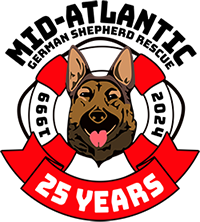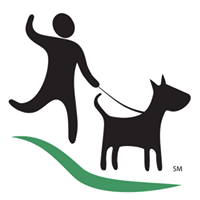Choosing the Right Trainer & Behaviorist
At MAGSR, we believe the most important thing you can do to ensure a successful adoption is to train your dog. Your dog will be better behaved and constructively occupied, and you both will be happier because you will have established ways to communicate with each other. For rescue dogs in particular, many of them need the self-confidence and assurance that they gain from effective obedience training.
But how do you select a trainer? Here are some important tips:
- Look for a trainer who relies on positive reinforcement for the right response rather than only punishing the wrong response.
- Observe an obedience class without your dog. Are the dogs and people having a good time? Talk with a few participants to see if they are comfortable with the trainer's methods. Ask for references and call them. If you are not allowed to sit in on a class or are refused references, don't enroll.
- Don't allow a trainer to work your dog unless he first tells you exactly what he plans to do...but look for trainers willing to handle the dogs in their classes first hand - not just "instruct" from a distnace.
- Don't be afraid to tell a trainer to stop if she is doing something to your dog that you don't like.
- Don't let a trainer (or anyone else, for that matter) intimidate, bully, or shame you into doing something that you believe is not in your dog's best interest. You should feel comfortable with your trainer and his training.
- Avoid a trainer who offers to train your dog for you without you being there. Obedience is not transferable - you must learn to train/control your own dog.
- Avoid a trainer who objects to using food as a training reward. Food is an acceptable positive reinforcement training tool.
- Do your research on different collars and pick the most effective collar for you and your dog and get a trainer who uses it. Some collars appear cruel but in realty are not. Still others are packaged as "gentle" or "humane" but can actually be quite harmful. Get the facts before you decide.
- Look for a trainer who treats both people and dogs with respect. It should be fun (but challenging) for both of you!
Sometimes behavioral problems extend beyond what can be covered in basic obedience. This is especially true in rescue, where dogs may already come with baggage to unpack. In this case, it's time to call in a behaviorist. But again, who do you call? More tips:
- Ask about the consultant's academic training in the science of animal behavior, as well as his hands-on experience.
- Ask about the consultant's certification--it indicates the individual has met strict requirements in terms of educational experience and professional ethics.
- Look for a consultant who recognizes the importance of you working through the problem with your pet rather than sending him somewhere to be "fixed."
- Ask if the consultant is an active member of any professional organizations. Membership suggests communication with colleagues and an interest in keeping current on new information.
- Ask for professional references (e.g., from former clients, colleagues, and veterinarians who refer cases).
- Assess whether the consultant is knowledgeable about positive reinforcement methods, behavior modification techniques such as counter-conditioning and desensitization, and how to use food and humane products (such as head collars) in her work.
- Look for a consultant who will treat you with respect and is not abrupt or abrasive.
- Avoid a consultant who guarantees problem resolution. Animals are complex beings, and no one knows everything there is to know about them.
- Avoid quick fixes and any consultant who promotes them. This approach does not do justice to you or your pet.
- Beware of a consultant who suggests the use of drugs as the first or only solution for a problem. Drug therapy is best used as part of a complete plan. (Only veterinarians can prescribe drugs.)
* Reprinted with permission from the book Pet Behavior Protocols by Suzanne Hetts, Ph.D.
Items in this list are modified from those developed by S. Hetts, appearing in C. Rosenthal, 1996, Beware the dog trainer! Advocate 14 (2/3): 16-7. Reprinted by permission of American Humane Association




